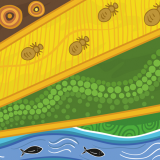We are committed to improving the health of Aboriginal and Torres Strait Islander peoples.
NHMRC’s commitment to improving Aboriginal and Torres Strait Islander health outcomes covers all aspects of our principal functions:
- pursuing activities which raise the standard of individual and public health throughout Australia
- fostering the development of consistent health standards between the states and territories
- supporting medical and public health research and training and promoting consideration of ethical issues related to health.
This commitment, through the support of health research and its translation, is set out as a priority in our annual Corporate Plan. Further details on strategies to strengthen the Aboriginal and Torres Strait Islander health sector and identify priority health research topics are documented in our strategic framework (current: Road Map 3).
In developing and actioning Road Map 3 in the 2024–2027 triennium, NHMRC works with the NHMRC–MRFF Indigenous Advisory Group (IAG). In the previous two triennia (2018–2021 and 2021–2024) the advisory committee was the Principal Committee Indigenous Caucus (PCIC).
NHMRC encourages grant applications looking to improve health outcomes as well as build and strengthen capacity and capability in the Indigenous health and research sectors.

